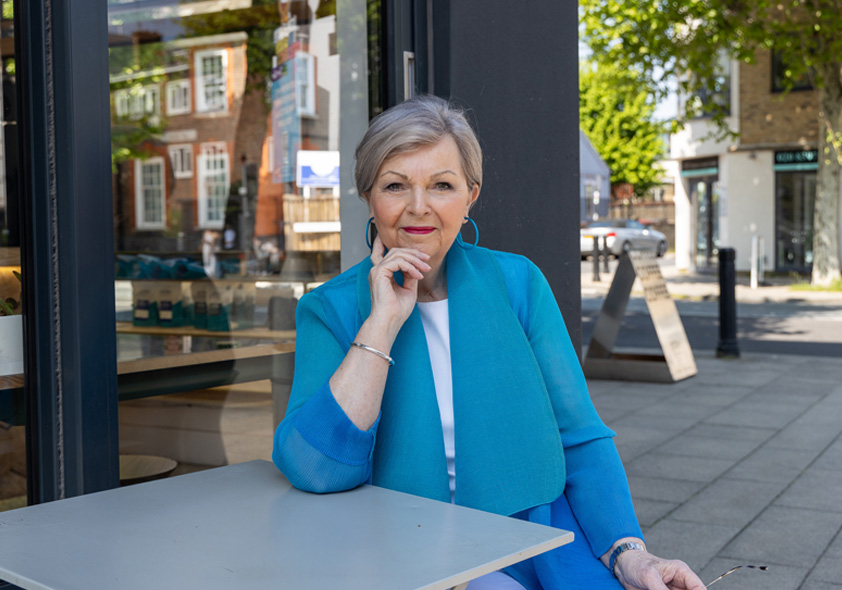
On July 4th I will exercise the right that all females over 21 have had in our country since 1928 and vote in a general election. It will be the sixteenth time I have done so, but it is the first time that I will have voted in an election during which my age has been such a salient issue. And that includes the assumption that as a person in her seventies, I must necessarily be less liberal, less interested in socially progressive policies and more antagonistic to all forms of immigration and, to boot, I am very probably transphobic and loathe Europe.
It's as though, with the hardening of my arteries has come a hardening of my heart, so that I can only consider the society in which I live from my own narrow, narrow-minded and selfish perspective in which I will only grant my vote to people who give priority to my concerns and pander to my demands.
This is played out via one side proposing pensioner tax cuts and military service to ‘ginger up’ all those snowflake teenagers as an appeal to the over 70s, whilst the other side suggests an extension of voting rights for 16 and 17 year olds, in the belief that all such teenagers would reliably vote for them, given the chance. I find myself bemused by this age-divide, but I guess that if you are fighting for every vote, you can understand why a political strategist would want to appeal to an ever growing older demographic which reliably turns up at the polling booth, or widen the pool of young voters to counter that considerable advantage.
However, as I am both a member of that older age group whilst also being a member of wider society with children and grandchildren about whom I care deeply, I loathe this attempt to pitch us against each other in the belief that my (assumed) needs, wants and concerns should trump all others because I am part of a very large group which takes the time and trouble to vote.
So, in an attempt to move away from all this divisive age versus youth rhetoric, I would like to ‘helicopter above’ any personal needs or preferences I might have in the coming election in order to consider the bigger picture of the demands that different generations make on the public purse.
To begin with, I guess that we have to accept that for various well-known reasons there is not much ‘wriggle room’ for whoever is elected into government on July 4th. Money comes into the treasury from two main sources: the taxation that is levied on people, businesses, goods and services, which raised about £625 billion in 2023/24, whilst the total income from both general taxation and what are called ‘other revenues’ is around £1,139 bn. In addition a government can borrow extra money, but this creates debt that has to be serviced and potentially repaid at some point. There are various ways that the income and tax take can be improved. One is by ‘growing the economy’, but this requires both private and public investment, or more people can be employed and they can then be encouraged or supported to increase their productivity.
So far, so simplistic. Like all advanced western societies we have a population which looks like an inverted pyramid with a shrinking pool of younger people and a growing population of people over the age of 60. The shortfall of workers can be filled in three or four different ways. One is via immigration so that you import the skills you need or to fill the jobs that people here either cannot or prefer not to do. The second is to ensure that everyone who can be economically active is enabled to do so either via affordable childcare and nursery provision or schools that have extended hours so that both parents can work full time. You can also delay paying the state pension and require people to work and pay tax for longer, and finally you need people to be able to access health care, because it’s difficult to work if you are in chronic pain or cannot work because you are physically or mentally incapable of doing so.
That’s the ‘supply side’ of the equation, which brings me to the ‘demand side’, or where the money goes given the competing demands of the different groups of which we ‘pensioners’ are a large and vociferous group with a great deal of power at the ballot box.
Pensioner Poverty
In the quite recent past, pensioner poverty was very real and, many would argue, still exists for those who rely entirely on their state pension which is one of the lowest in Europe. The problem used to be that the level of pension you received at 60 if you were a woman, and at 65 as a man, were at the whim of whichever Chancellor of the Exchequer was in power on budget day, although they did track inflation and average wage increases.
In 2011 the government introduced the ‘triple lock’ for the first time which has lifted many pensioners out of poverty by linking annual increases in the state pension either to whichever is highest out of price inflation, the change in average earnings, or 2.5%. The state pension cost £110.5bn in 2022-2023, just under half the total amount that the government spends on all benefits. The Office for Budget Responsibility projects this to grow to £124bn in 23/24.
The Triple Lock
The issue at a time of straightened public finances is that the triple lock has cost £11 billion more a year than it would have done if the pension had increased in line with earnings. The result is that because of this cast-iron commitment, the average pensioner household currently has a higher income than the average working one. However, it would be a brave Chancellor who proposed any assault on the triple lock, mainly because older retirees feel, rightly, that they have worked extremely hard for whatever the state now provides and that, when younger, they went without and waited until they could afford something before buying it. Also, the age at which you can draw the state pension has been pushed forward to age 66 for both sexes, in a way that many women in particular feel was both unjust and unfair.
Maybe I should also point out that older generations have always been generous towards younger ones and that the Bank of Mum and Dad is a real and valuable source of funding for many who are struggling to pay their way. And then there are all those parents who have ‘welcomed’ their adult offspring back home because they can afford neither exorbitant rents nor a home of their own. And what about the army of older people who supply free childcare every week to grandchildren, or who are caring for a loved one at home, saving the state billions of pounds?
The NHS
Besides pension entitlement, an ageing population places an inordinate demand on the healthcare system. Our NHS is one of the few in the world that is entirely free at the point of use and was set up in 1948 in the belief that free healthcare would gradually mean that a healthier population would create fewer rather than greater demands on it. However its architect, Nye Bevan, did not foresee the development of ever more complex and expensive treatments and drugs. The Department of Health spending on the NHS in 22/23 was £181.7bn, a figure necessarily inflated by the cost of both the Covid pandemic and the provision of vaccines, which alone cost an extra £1bn. However, it’s hard to believe that spending on the NHS will or can go down as the older generation places ever more demand on it.
And what of the other group in society that falls into the ‘demand’ more than the ‘supply’ side of the equation, not because they are too old or ill, but because they are too young? In 2022/23, total spending on education in the UK stood at £116bn. This includes the cost of issuing student loans at 23/24 prices. However, in real terms, this represents an 8% or £10bn fall since 2010/11. Why? Because there has been a 9% real-terms cut in school spending per pupil and a 14% fall in spending per student in colleges. Such cuts have never before happened in post-war UK history. I’ll leave you to join the dots between these cuts to the education of each state school child of £10bn and the £11bn that has been transferred to pensioners via the triple lock.
I set out to write this to satisfy myself about some of the facts and statistics that underlie the rhetoric to which we are all subjected during an election campaign. Hopefully you have found it as illuminating as I have. Whoever forms the next government will have monumental challenges because of the competing demands of all the various big spending departments, and the current weakness of our economy,
I can honestly say that, contrary to current belief, I have not become more conservative (with a small ‘c’) but more radical as I have aged. Because of this I get very cheesed off when commentators imply that all over 70s are stroppy mean-spirited old fogeys with tunnel vision entirely focussed on their own selfish concerns at the expense of everyone else. I feel that the time has come for a new social contract between the generations because, ultimately, the older generation will always have to rely on those younger than us to produce the money that we expect to be provided to fund our pensions and health and social care, just as, in our turn, we worked hard and paid our taxes to create wealth for the country.
Last time I wrote a blog pointing out some of the more glaring demographic inequities, I was met by some of you with considerable outrage. Hopefully this time I have made a slightly better case. We may be a loud, vociferous and growing group of very reliable voters come election time, but we should be wary of demanding that the world always be bent to a shape which meets our needs and wants at the expense of our children and grandchildren.
I am looking forward to exercising my democratic rights on July 4th, when I will vote in the hope that the incoming government will make choices which can improve life for everyone in the country, no matter how old they are.
*Most of the figures quoted here are from the OBR (Office for Budget Responsibility)
Tricia x
Watch Our Latest Video...
How To Create A Smokey Eye
Sally shows you how to create a smokey eye look for older women...














